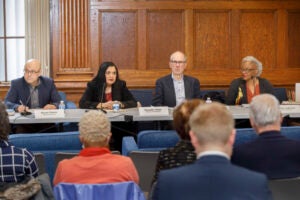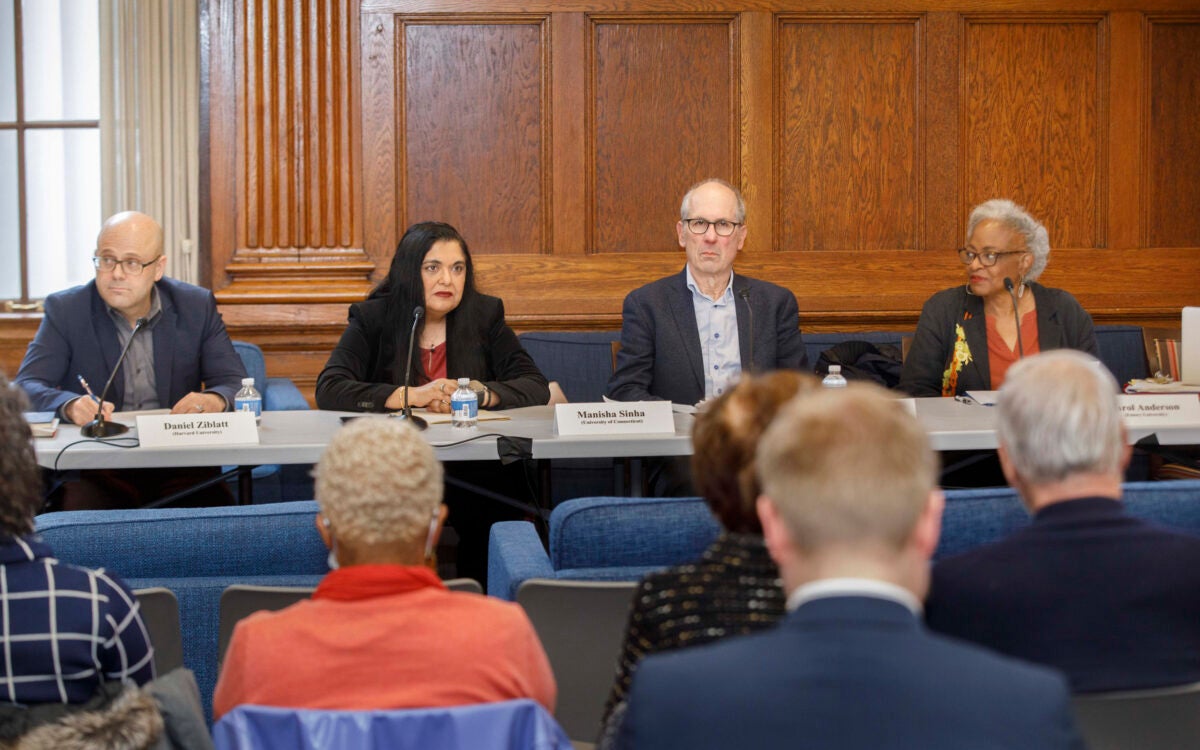Student KSG, HBS veterans honored
Panelists say lead by example biggest wartime lesson
Student veterans of the wars in Iraq and Afghanistan shared hard-won lessons of leadership Tuesday evening (Feb. 20), providing a glimpse of the self-sacrifice, courage under fire, and devotion to comrades needed to lead U.S. troops into battle.
Drawing on their own experiences and those of other U.S. military personnel in recent years, three current and one former student of the Harvard Business School and the John F. Kennedy School of Government painted a poignant, personal picture of the nation’s war on terror.
Using examples such as the lieutenant colonel who insisted on standing between his men and possible explosive devices they were inspecting, the panelists, who largely focused on the struggle in Iraq, repeatedly returned to two critical factors in successful leadership there: the importance of leading by example and their dedication to the people under their command.
One panelist, Joseph Ewers, a U.S. Army major and masters in business administration student at Harvard Business School, said he felt guilty leaving his troops to come to Harvard to study. Other panelists also mentioned feeling guilty leaving behind people on whose actions their lives depended.
The event, co-sponsored by the Center for Public Leadership and the Institute of Politics, featured an hourlong panel discussion followed by a half-hour of questions from the John F. Kennedy Jr. Forum audience.
A military color guard marched with the U.S. and other flags to begin the event. Kennedy School Dean David Ellwood and Center for Public Leadership Director David Gergen introduced the event, saying it is just one way that Harvard has honored members of the military over the years.
Ellwood said that there are many lessons about leadership that can be learned from the military because the military as an institution “chooses leaders as if their lives depend on it.”
Gergen said the event was intended to honor nearly 100 students at the Business School and the Kennedy School who had served in either Iraq or Afghanistan. Despite the increasing divisions nationally over the war at a policy level, Gergen said the event was meant to signal support for those on the ground doing the difficult work of executing the war.
“We’re renewing a long tradition tonight of honoring those who served,” Gergen said.
Gergen and U.S. Army Lt. Col. Frederick Wellman, a mid-career student at the Kennedy School, moderated the event, asking the four panelists questions. The panel included Ewers, Army Lt. Col. Oscar Hall, a Kennedy School National Security Fellow; Daniel Wagner, a former major in the U.S. Marine Corps and 2002 Kennedy School graduate; and Maura Sullivan, a former Marine captain and a student at the Kennedy School.
Hall, who was an Army Armor Battalion Commander in Iraq’s Diyala Province, said that leading by example – “demonstrating what right looks like” – and intensive training are the keys to successful command. Hall said he went on 387 combat patrols during his time in Iraq. Leading by example is critically important in Iraq, he said, because the Iraqi security forces do not have the corps of non-commissioned officers that are a structural backbone for the U.S. military. Instead, he said, the Iraqi forces expect officers to play that role, making their training even more critical. Many of the Iraqi officers he trained and worked with have died in the war there.
Ewers, a company commander with the Army’s 1st Battalion, 6th Infantry Regiment who served in Baghdad and Iskandariyah, said that leadership and training is critical, but said leadership’s example extends even into unguarded and emotionally-charged moments. An officer’s reaction when a soldier is killed, when the unit’s tour is extended, when he or she makes a mistake, and even how he or she treats civilians on the street is critical and watched by those under his or her command.
Sullivan, a captain in the Marine Corps Reserve who served as Current Operations Watch Officer for the Combat Logistics Battalion 8 in Fallujah, echoed the others’ assertions on the importance of leading by example and said it requires a huge amount of selflessness on the part of the leaders.
Being a woman mattered very little, Sullivan said, adding that the military has gotten to the point where individual differences such as gender, don’t matter, saying “it’s not who’s inside the suit, it’s the suit.”
When asked where the selflessness comes from, Sullivan said it comes from a commitment to the people with whom you serve.
“Your battalion is your family. You’d do anything for the guy on the right or left because you know they would do it for you,” Sullivan said.
Other important factors in a successful military leader include the ability to adapt to changing circumstances and avoiding complacency, which can prove deadly in an environment where danger often arrives unexpectedly, according to Wagner, a Marine Reserve lieutenant colonel and senior intelligence analyst.
Wagner, who served in Iraq’s Anbar Province in 2005 as a Civil Affairs Team Commander for the 1st Marine Division, offered the example of the Iraqi elections in October 2005, which had low participation despite a visible U.S. presence. After talking with local leaders, Wagner said, they realized that the U.S. presence was one reason the turnout was so low, so in December elections, the military backed off and turnout soared.
Though most of the U.S. population hasn’t served in Iraq or Afghanistan, panelists said they feel guilt about leaving their comrades behind. Wagner, who was seriously wounded in a mortar attack when shrapnel flew through his neck, said he felt a “tremendous sense of guilt” at leaving his men behind.
Panelists said the national debate over the war is not echoed on the ground in Iraq. Soldiers keep their minds on their mission. Ewers said he made a point to regularly point out the good they were doing by building schools and other infrastructure.
Gaining the trust of the local people is a critical step in the success of any project, panelists said. Schools, water supplies and roads typically top the list of needs presented by local leaders.
In some areas, however, that trust has been lost, and it will be difficult to bring it back, Wagner said.
Panelists said for the Iraq reconstruction to be successful, it will take efforts by the entire U.S. government, not just the military.
Lt. Gen. Douglas Lute, who serves as director of operations at the Joint Staff, delivered closing remarks and also addressed the students and their families at a dinner after the event.
Lute said a window of opportunity was open in Iraq where the local people gave the U.S. consent to help establish a new government. That window is closing, he said, though it’s unclear if it has closed completely.
Lute, who graduated from the Kennedy School in the early 1980s, delivered a brief message to the veterans in the audience after the dinner. He urged them to “bring their military experience with them to Harvard” to make sure that that point of view is represented here, to stretch their own boundaries while studying here, and to continue to serve even after they leave the military.




